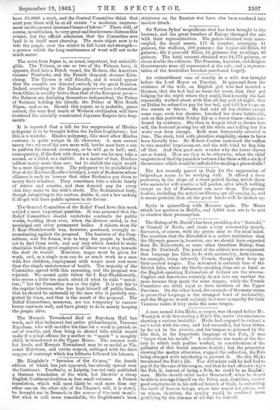The General Committee of the Relief Fund have this week
settled a most important question. It was proposed that the Relief Committees should undertake contracts for public works, handing them over, when the distress ended, to the municipal and other permanent bodies. A minute from Sir J. Kay- Shuttleworth was, however, produced, strongly re- monstrating against the proposal. The business of the Com- mittees, said Sir James, was to keep the people in health, not to find them work, and any step which tended to make charitable bodies great employers of labour was a step towards the droit du. travail. Moreover, wages must be given for work, and, as a single man can do as much work as a man -with five children, employment with wages must cost more than the simple maintenance of health. The majority of the 'Committee agreed with this reasoning, and the proposal was rejected. We cannot quite follow Sir J. Kay-Shattleworth, who seems a little too much afraid of what he calls " social- ism; " but the Committee was in the right. It is not fair to the regular labourer, who has kept himself off public funds, that he should be undersold by the man who is partially sup- ported by them, and that is the result of the proposal. The Relief Committees, moreover, are too temporary to execute heavy contracts well, and have plenty to do in merely keeping the people alive.






























 Previous page
Previous page